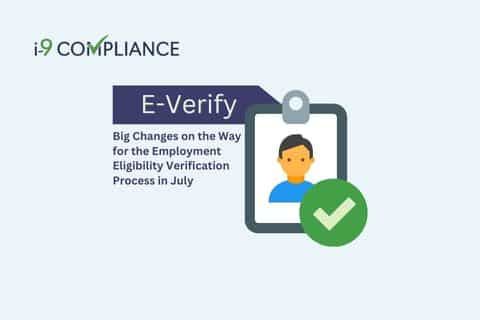Big Changes on the Way for the Employment Eligibility Verification Process in July

Recent announcements from the state of Florida and the federal government indicate upcoming significant changes. These changes pertain to the employment eligibility verification (Form I-9) process starting in July.
An example of these changes concerns Florida-based employers. Florida has mandated private employers to use the E-Verify program. As a result, employers with at least 25 employees in Florida must begin using the federal government’s verification program starting July 1.
Nationwide employers must also make adjustments due to the federal government’s announcement. According to the United States Citizenship and Immigration Services (USCIS), it would end the temporary remote flexibilities. The USCIS started this program early in the pandemic, and after several extensions, it has finally confirmed the end. As such, employers must review these changes and their impact before they take effect.
Florida’s Mandatory E-Verify Policy
Signed into law on May 10, 2023, Florida’s SB 1718 would take effect on July 1, 2023. State law already required public employers to use the federal government’s E-Verify program. However, this bill expands the requirement to private employers of 25 or more employees.
E-Verify, an internet-based system, utilizes the information collected on Form I-9s and compares it against records maintained by the Department of Homeland Security (DHS) and the Social Security Administration. This comparison aims to verify an individual’s eligibility to work in the United States, ensuring compliance with immigration and employment regulations.
Florida’s new law requires employers of 25 or more employers to verify new hires via E-Verify. This law takes effect on July 1, 2023, and requires them to retain the documentation for at least three years. In addition, employers must verify their compliance on their first unemployment tax return filed each calendar year. Failure to comply with these requirements could result in fines of up to $1,000 per day and revocation of business licenses. However, enforcement of penalties will only begin on July 1, 2024.
End of Temporary I-9 Flexibilities
Since March 20, 2020, the USCIS allowed employers to remotely inspect employees’ identity and work authorization documentation. However, the agency emphasized that this flexibility would eventually end and recently scheduled the flexibilities to stop on July 31, 2023.
The DHS also commented on the end of the temporary remote flexibilities. According to the DHS, employers have until August 20, 2023, to physically inspect documentation verified through these flexibilities. This end means employers must now verify I-9 documentation for new hires and employees in person.
Employer Takeaways
E-Verify and Form I-9s undergo constant changes, making it challenging for employers to comply with the employment eligibility verification regulations. As such, Florida’s new E-Verify requirements and the end of remote I-9 flexibilities will require rapid changes for employers. The best way to help ensure continued compliance is to incorporate an electronic I-9 management system with E-Verify integration. This tool will provide step-by-step guidance through the verification procedure and ensure the safe storage of forms and documentation.
Ensure compliance today by switching to an electronic I-9 management tool with I-9Compliance.